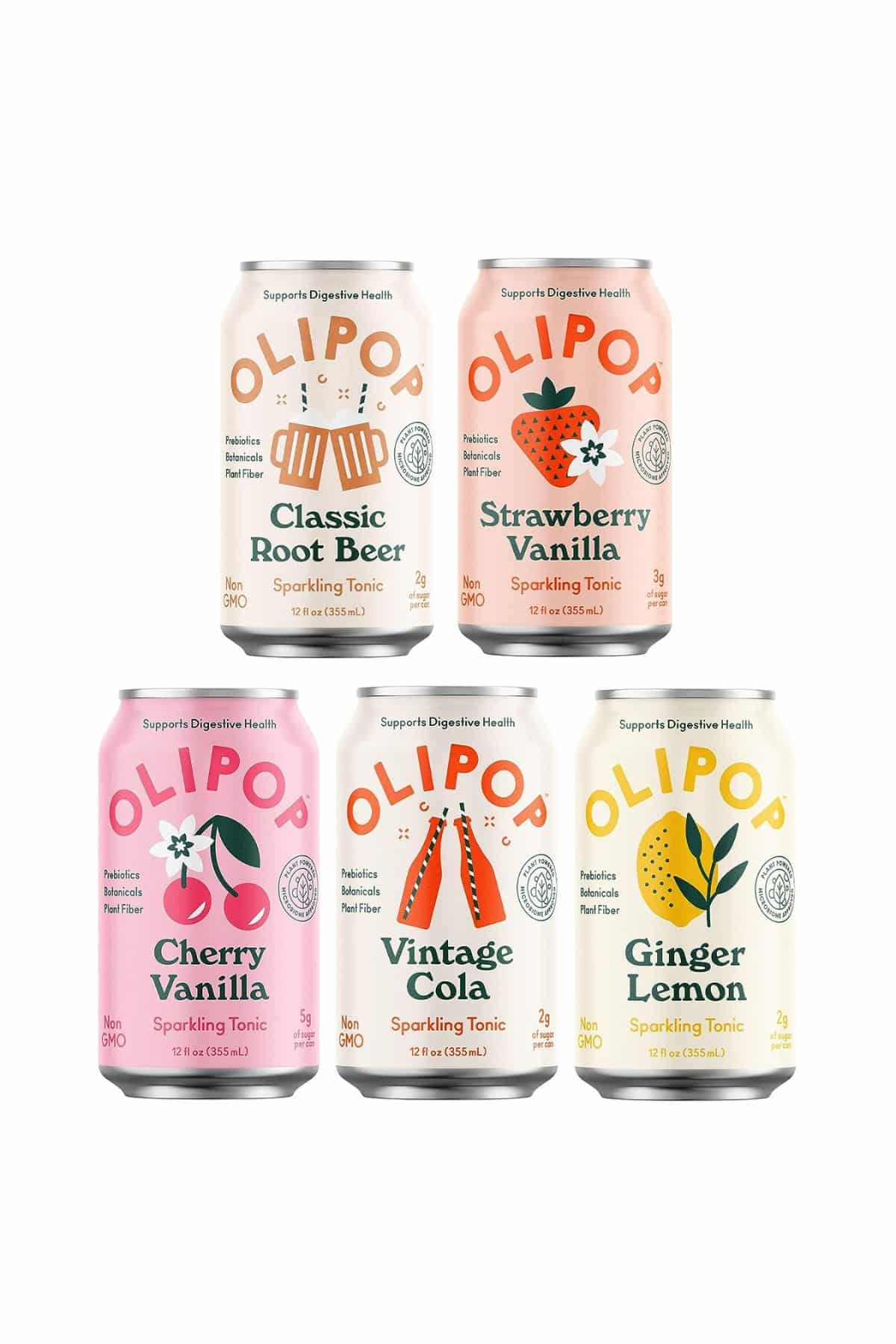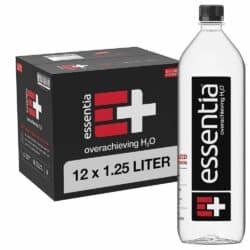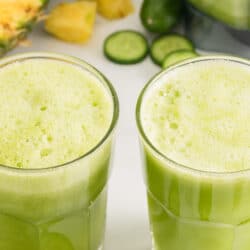Is Olipop Good For You (From a Nutritionist)?
In this blog post, I’ll review whether Olipop is good for you or not? Find out this product’s nutrition pros and cons and whether it’s okay to give to kids. For most people, Olipop is a good replacement for sugar-sweetened sodas.

Olipop Facts
Olipop is a new kind of soda beverage launched in 2017 by Ben Goodwin and David Lester. The drink comes in 355 ml cans.
It’s available in a range of flavors:
- Vintage Cola
- Classic Root Beer
- Lemon Lime
- Cream Soda
- Doctor Goodwin
- Strawberry Vanilla
- Cherry Cola
- Watermelon Lime
- Classic Grape
- Tropical Punch
- Cherry Vanilla
- Orange Squeeze
- Banana Cream
- Ginger Lemon
Olipop markets its beverage for people of all ages who like the taste of classic soda flavors but want a healthier alternative that supports digestive health with prebiotic fibers and without the high sugar content and artificial ingredients of traditional sodas.
This product contains prebiotics, fiber, and botanical extracts, is gluten-free, vegan, and non-GMO, and is marketed as paleo and keto-friendly with no artificial sweeteners, colors, flavors, or preservatives.
The main ingredients of Olipop sodas include a formula called OLISMART which contains cassava root fiber, chicory root inulin, Jerusalem artichoke inulin, nopal cactus, marshmallow root, calendula flower, and kudzu root.
The sodas also contain carbonated water, fruit juices, and stevia. Some flavors may contain ingredients like marshmallow root and caffeine green tea extract.
Olipop Ingredients
Most Olipop sodas contain at least 15 ingredients. The company claims that many of these ingredients are sourced from natural ingredients.
However, the company does not provide exact details of the manufacturing process and whether they use chemicals to extract these ingredients.
For the Olipop Vintage Cola flavor, the ingredient list looks like this:
- Carbonated Water
- OLISMART (Cassava Root Fiber, Chicory Root Inulin, Jerusalem Artichoke Inulin, Nopal Cactus, Marshmallow Root, Calendula Flower, Kudzu Root)
- Cassava Root Syrup
- Apple Juice Concentrate
- Lime Juice
- Natural Cola Flavor
- Alpinia Galanga Root
- Stevia Leaf
- Himalayan Pink Salt
- Green Tea Caffeine
- Natural Vanilla Flavor
- Natural Caramel Flavor
- Cinnamon
Here is some more information about the main ingredients in Olipop and what you should know about them.
Caffeine
A single serving of Olipop’s caffeinated sodas contains approximately 50mg of caffeine from green tea caffeine extract.
Caffeine is a naturally occurring stimulant found in black and green teas and contains several health benefits, such as better brain function, lower risk of cardiovascular disease, and prevention of Alzheimer’s disease and Parkinson’s.
Although caffeine can provide all these health benefits, beverages containing this stimulant should be consumed in moderation. Overindulging in caffeinated drinks could cause a few side effects, such as headaches, dizziness, insomnia, and high blood pressure.
It’s generally advised that children under the age of 12 do not consume any caffeine.
Cassava Root Fiber
Cassava is a woody shrub native to South America and has a slightly earthy or nutty taste.
The cassava root provides carbohydrates, vitamin B and vitamin C, and pure resistant starch – a type of prebiotic fiber.
The starch resists digestion by bypassing the small intestine and entering the large intestine, where the beneficial bacteria living there ferment it.
Since resistant starch doesn’t raise glucose levels, it may be suitable for diabetics.
Chicory Root Inulin
Inulin is a type of prebiotic fiber, and chicory root contains about 40% inulin.
This prebiotic fiber makes its way to the undigested intestines, affecting the microbiota’s structure and production levels in your gut with little to no effect on blood sugar levels.
The beneficial bacteria then use this fiber as fuel to keep the gut working properly, absorbing minerals and vitamins from food and supporting your immune system in the process. It’s an intricate, and interesting system.
Chicory root used in food items is generally safe to consume, but a few minor side effects may occur in the GI system for some individuals with a sensitivity to the root. These side effects may include bloating, gas, or belching.
Kudzu Root
Kudzu is a type of vine that is native to Southeast Asia, and the root of the vine has been used as an herbal medicine to treat several health conditions like diarrhea, fever, cardiovascular diseases, and diabetes.
It is also a prebiotic (indigestible) fiber that may help support a healthy gut microbiome.
Stevia
Stevia is a natural sweetener made with the leaves of the Stevia rebaudiana plant.
The calorie content is so low that it is considered a non-nutritive sweetener. While sugar contains about 16 calories per teaspoon (or 4 calories per gram), and unlike sugar, stevia is never stored in the body as fat.
Although it comes from a plant, stevia is not necessarily healthy for everyone. There is some research on the side effects of consuming stevia, including the effects on fertility. There may also be negative effects of stevia on the microbiome.
Calendula Flower
Many people know calendula as an ingredient in skin products and as a treatment for wounds and other skin conditions, but the sweet-tasting flower also contains other health properties. It is rich in beta-carotene and lutein, which are good for eye health and brain health.
The anti-inflammatory properties of calendula may contribute to preventing muscle spasms and menstrual cramps.
Although this pretty, vibrantly colored flower is generally safe to consume or apply to the skin, it might cause allergic reactions in people who are already allergic to ragweed or other plants in the same plant family (Asteraceae).
Nutrition Pros
Olipop drinks are gluten-free, GMO-free, vegan, paleo-friendly, and low in added sugar compared to regular soda and soft drinks.
Each serving contains 35 calories, 16g of carbohydrates, and 9 grams of dietary fiber, consisting of plant fiber prebiotics such as cassava root and chicory root.
If you swapped out regular soda for Olipop, it would likely be considered a healthier option and could even support weight loss with digestive benefits.
Nutrition Cons
Although there are some nutritional benefits to Olipop sodas, they may be unsuitable for people sensitive to caffeine or specific plant ingredients such as calendula flower.
Although low in sugar, Olipop sodas may not be suitable for diabetics, children, or breastfeeding women – even though these drinks don’t contain as much sugar as regular soda, they’re not sugar-free.
Lastly, according to Olipop, their Cola flavored beverages get their flavor from “natural” sources. Since there’s no official definition of what natural flavoring is, manufacturers can call any flavoring natural. It becomes worrying that some so-called “natural flavors” are manufactured using potentially dangerous chemicals.
Can Kids Drink Olipop?
Many parents wonder if it’s okay to give their children Olipop, especially as an alternative to regular sodas or diet sodas. Here are some thoughts.
- Sugar Content: Olipop contains significantly less sugar than regular sodas, but it’s still important to monitor overall sugar intake in children’s diets.
- Prebiotics: Olipop includes prebiotics, which are beneficial for gut health. While prebiotics are generally safe for children, introducing them in large quantities can sometimes cause digestive discomfort, such as gas or bloating, especially in younger children.
- Artificial Sweeteners and Additives: Some Olipop flavors contain natural sweeteners like stevia or monk fruit. While these are generally considered safe, it’s a good idea to be cautious with children’s intake of any non-nutritive sweeteners.
- Caffeine: Some Olipop flavors contain caffeine which is not recommended for children.
Olipop can be an occasional treat for older children, particularly if they are used to consuming sugary sodas and you’re looking for a healthier alternative.
As always, it’s a good idea to consult with a pediatrician before introducing new foods or beverages into a child’s diet.
FAQs
Although Olipop is a processed carbonated beverage product, it does contain prebiotics, fiber, and botanical extracts designed to help support gut health. Compared to some of the more well-known and bigger brands of sodas, Olipop is lower in sugar and has natural ingredients.
This means that if you love the taste of soda, Olipop could be a healthier choice. However, making your own healthy drink at home is always better. You could try carbonated water infused with herbs and fruits for a refreshing drink with an added health boost.
Yes, it does. Although Olipop is a low-calorie soda, it contains sugar. However, compared to some of the bigger brands of sodas that contain about 44 g, or 10.5 teaspoons, of sugar, a can of Olipop only contains 2 to 5 grams of sugar, which is only around one teaspoon of it.
No. Olipop is sweetened with stevia, fruit juice, and cassava syrup. However, the manufacturing processes of these sweeteners may involve unhealthy chemicals, and some people are sensitive to these sweeteners. I personally find the taste of Olipop to be overly sweet and unnatural.
Olipop contains about 35 calories per 12-ounce can. A standard 12-ounce can of soda contains about 150 calories.
Yes, it does. Olipop contains prebiotic fiber, which helps support gut health by providing the right environment for healthy bacteria to live. In return, those healthy bacteria give you better overall health and keep your system running more effectively. The main source of prebiotic fiber in Olipop soda is ingredients such as chicory root, Jerusalem artichokes, and Nopal cactus.
Yes. Olipop is gluten-free, but it is also non-GMO, vegan, and paleo-friendly.
Don’t Miss These Popular Drink Reviews!
Conclusions
Soda is one of the most consumed beverages in the world, with some of the most recognizable brands found in almost every country. Although these beverages are popular, they are not healthy. Olipop may be a slightly healthier alternative to regular soda, but it’s still a mass-produced, processed product containing sugar and caffeine. Making a healthy drink with real food ingredients at home is always a better idea.
Don’t forget to join my newsletter list to get exclusive clean eating recipes and tips. The newsletter is 100% free with no spam; unsubscribe anytime.
About the Author: Carrie Forrest has a master’s degree in public health with a specialty in nutrition and is a certified holistic nutritionist. She is a top wellness and food blogger with over 5 million annual visitors to her site. Carrie has an incredible story of recovery from chronic illness and is passionate about helping other women transform their health. Send her a message through her contact form.
Note: this post is for informational purposes only and is not intended as medical advice. Please consult your healthcare provider for recommendations related to your individual situation.




















